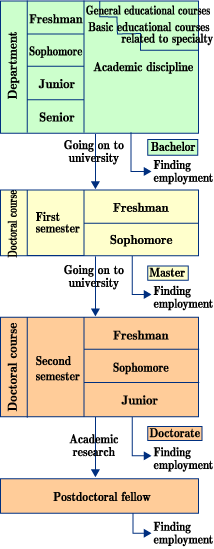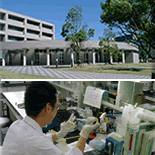Health Science is an interdisciplinary field that helps provide a medical foundation to the public and facilitate disease prevention and recovery. By doing so people can enjoy healthy and quality living. Goals include comprehensive education and research of basic knowledge, sophisticated expertise, and skills, as well as the establishment of health science as a recognized field. Our basic philosophy is to educate and develop cultured and sensitive nursing professionals, medical professionals, educators, and researchers. We also expect them to have creativity and problem-solving capabilities.
|
| Area of Integrated Health and Nursing Science |
| Department of Evidence-Based Clinical Nursing |
| Recent clinical research in nursing has demonstrated that nursing intervention improved patient condition, prevention of concomitant diseases, and patient quality of life. However, scientific evidences compiled regarding nursing care so far are simply not sufficient. In development science courses for practical nursing, students continue to compile clinical evidence regarding nursing care and work to develop an evaluation method and theory of nursing care. |
|
|
| |
| Department of Children and Women's Health
|
| Obstetrical nursing deals with birth and the development of healthy babies. This becomes an increasingly important field in an aging society with a (diminishing? decreasing?) falling birth rate. As the traditional family structure changes, expectation and support toward childbirth and child rearing have been changing. Our goal is to conduct cutting-edge research in practical nursing while considering different social needs. |
|
|
| |
|
|
| Department of Health Promotion Science |
| As local medicine develops, caregivers' science, specifically dealing with patient support, needs to be addressed. In the future, life-style related diseases such as hypertension and diabetes are expected to rise significantly. Therefore the main focus of 21 st century medicine is shifting toward maintaining and enhancing good health as well as preventing diseases. Goals of the local health promotion science courses are to investigate methods, implementation and evaluation of health promotion toward individuals, families, groups and different environments. In particular, health promotion towards in-home senior citizens means implementing health promotion in the home care environment. In addition, we take the initiative to adopt a mathematical approach toward health science in order to predict and forecast future health needs. We encourage research to help caregivers improve and enhance patients' health. At the same time, we are developing assessment technologies based on the problem solving mentality and creative care technologies from the human engineering perspective. We investigate applications of new technologies and establish a training method for these technologies. |
|
|
|
| |
| Area of Medical Technology and Science |
| Department of Functional Diagnostic Science
|
| The aim of these courses is to develop basic diagnostic technologies. We conduct research to develop more sensitive, target-specific, and accurate diagnostic methods based on or taking advantage of the methodologies using basic physical, chemical, biological, and genetic engineering technologies. We also aim to develop computer-assisted diagnostic systems and non-invasive, quick and inexpensive diagnostic technologies using the minimal quantity of samples. |
|
|
|
|
| |
| Department of Medical Physics and Engineering
|
| These courses are based on the physical and biological principles as well as on engineering as an applied science. Goals of these courses are to develop and identify the application of the following medical apparatuses: image diagnostic devises, diagnostic devices for physiological functions, therapeutic instruments, and welfare engineering devises. Medical Physics and Physical Engineering are research fields, which include Medical Engineering (ME). In addition, our aims are ranging from researching new biological and physical measuring principles as well as diagnostic principles to clinical development of innovative diagnostic apparatuses. |
|
|
|
| |
| Department of Biomedical Informatics
|
| In these courses, we conduct cutting-edge research that is comprehensive in three fields related to information science: bioinformatics, clinical informatics, and public health informatics. Bioinformatics is based on molecular biology and focuses on biomedical information observed from many different hierarchies such as molecules, cells, organs, individuals, and society. Clinical informatics pertains to laboratory diagnoses, drug therapies, and disease prognoses. Public health informatics deals with issues related to hospital organization, coordination among medical facilities, medical benefit policies, and risk management. Our goal is to train and develop capable researchers and educators who are specialized in these fields. These researchers will have practical skills so that they are capable of developing common concepts and systems and evaluating them. |
|
|
|
 |


